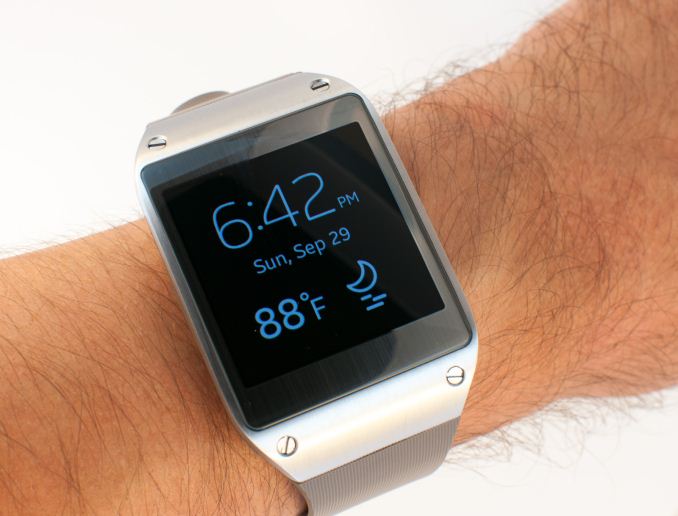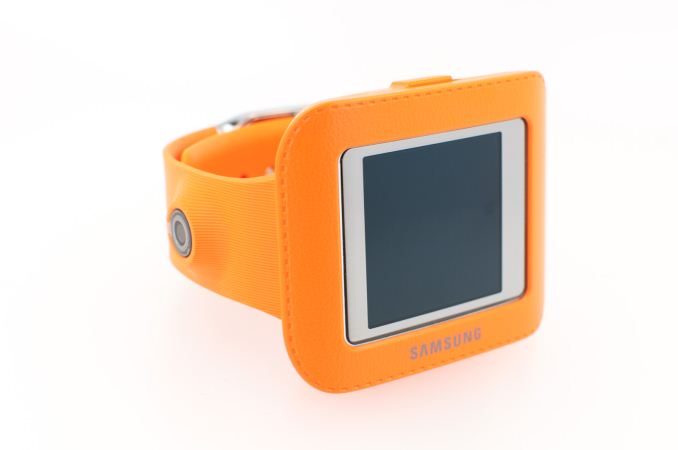Samsung Galaxy Gear Review
by Brian Klug on October 1, 2013 9:00 AM EST- Posted in
- Wearables
- Smartphones
- Mobile
- Galaxy Gear
- galaxy note 3
- watches
Final Thoughts
It's immediately apparent that there's a bit of panic around what happens as the smartphone/tablet markets mature. The incredible growth the leaders in those industries enjoyed over the past few years is addictive, and no one wants to be late to move onto the next thing. Wearables are an obvious target - the incredible amount of attention paid to Google Glass being proof that there is interest, should someone be able to get the formula right.
We've seen many attempts at building smarter watches over the years. Adding functionality to something you already wear seems logical, plus there's historical precedent here (calculator watches from the 80s come to mind). As lofty as the upside is, there's an equally depressing downside however. The stylish, most adored watches aren't those that have a ton of extra functionality added onto them. That's not to say that the two goals are orthogonal, just that industrial design matters even more with a wearable than it does with a smartphone.
Samsung did relatively well with the Galaxy Gear in that department. I don't know that it speaks to me like a luxury timepiece, but it's well built and doesn't feel cheap at all. I think a truly successful smartwatch will have to look first and foremost like a great timepiece, and I don't know that any of the initial players (Samsung included) are really there yet. I'll admit I'm puzzled by the decision to go with a plastic charging cradle that closes over the Gear instead of some connector and a USB cable, so maybe that's the first thing that really needs changing.
Architecturally, Samsung took a different approach to the Galaxy Gear than we've seen from most of the recent attempts (e.g. Pebble, Toq). Rather than optimizing for always on operation, the Galaxy Gear instead is treated like more of a smartphone - designed to be used in bursts, and relying on idle time to extend battery life.
It's sort of insane to think that the Galaxy Gear puts an Exynos 4212 on my wrist. On the flipside, the Galaxy Gear delivers downright smartphone-like battery life at a little more than 5 hours of continuous use and that's without cellular connectivity. The lack of an always on watch face is a bit bothersome since you'd expect something you wear on your wrist to always be able to, you know, tell time. Samsung attempts to mitigate the Gear's lack of an always on mode by using the accelerometer and gyro to detect when you're flipping your wrist to look at your watch face. The unfortunate reality is the gesture doesn't work all of the time, again putting you in a situation where you're wearing something on your wrist that doesn't always behave like a watch at the bare minimum.
It's also sort of crazy to think about Android 4.2, similarly, running on my wrist.
Truth be told, I don't know that either of these things are the right solution, at least today. An 800MHz Cortex A9 with some Mali-400 GPU configuration at 32nm and Android 4.2 are both too much for a watch-like device. In many ways Galaxy Gear feels a like tablet from the early 2000s. They used notebook hardware and notebook software, weren't fast enough, didn't last long enough on a single charge, and didn't have a great user experience. In the case of the Galaxy Gear, Samsung at least leveraged its experience in skinning Android to deliver an experience that felt mostly reasonable on a watch face. But the hardware needed to run the whole thing is excessive and as a result gives you very little battery life.
There are some nicely executed elements of the Galaxy Gear. The device is well built and doesn't feel heavy (although it is a bit bulky). Integration with the Galaxy Note 3 works well. The camera integrated into the wrist strap takes surprisingly decent photos as well. The calling-from-your-wrist experience isn't great though, and the device itself isn't waterproof (which is far more of an issue for something you wear on your wrist than something that lives in your pocket).
Ultimately the Galaxy Gear isn't the perfect solution to wearable computing, but rather a first attempt. It's more a proof of concept that you can own. If we look at Samsung's history in nearly every market we've followed it (SoCs, SSDs, smartphones), the company has a tendency to show up early with the wrong solution, but iterate aggressively to the point where it ends up with a very good solution.
In terms of interim improvement - I'd love to see more/better watch faces, broader compatibility with Samsung phones and a persistent clock. Let's start there and see where it takes us.












70 Comments
View All Comments
Gorgenapper - Friday, October 4, 2013 - link
Can you boil it down for the rest of us dumb dumbs.Netscorer - Monday, October 7, 2013 - link
Very interesting piece of information in history of design patents. But the problem many see in the Apple wars was not that they used design patents to protect their products in the first place, but how they used them. When you design something unique, that design should be protected, no doubt. But when you design a squarish blob with rounded corners and claim it to be unique, that's the problem. Companies have other means of distinguishing their products when using mundane form and design patterns. It's called logo. Company logo is always unique, protected by multiple laws and is easy way to distinguish one product from another. You don't see Drink manufacturers, for example, squabbling about bottle shapes in general. yes, there are some unique bottle shapes, but 99% of all bottles look the same. What distinguishes them one from the other, of course is branding, i.e. using color palette and logo to provide quick identification and association with consumers. Apple, just by the fact of being first to market, decided, basically, to patent generic bottle of smartphone shapes. Then it tried to SELECTIVELY sue other vendors who obviously stepped into the same common sense design decision.digitalgriffin - Monday, October 7, 2013 - link
Patents also can't be frivolous or vague, and have in some way be unique and not common sense.Navigating apps through gestures is nothing new or unique. Finger gestures control have been around for years ever since the digitizing tablet was invented. Saying a left swipe to bounce back it about as patentable as me saying me scratching my ass is trademark motion.
LostViking - Friday, October 11, 2013 - link
Everyone understands that these patents are great for big, powerful companies. Some of us just feel the user is more important.And before you say it, I don't believe that it would be impossible to make money selling phones in a world where you couldn't patent design.
1ndian - Tuesday, October 1, 2013 - link
So, who did Samsung copy in SSD, Memory, Laptops, Home Appliances, TV, Medical Equipments, Displays, Cameras, Ship building, etc.? Let's go back and say Apple copied GUI from XEROX. They do make some good products and some crappy products. But please don't talk like everything started with iPhone or Applefri2219 - Tuesday, October 1, 2013 - link
GE, Toshiba, Intel, Fujitsu, Matsushita, Toshiba, Sharp, Siemens, Bell Labs, and just about anyone else they thought could make them a buck. Samsung has a sordid history of sleaze, including but not limited to, repeated convictions for bribery, price fixing, astroturfing, and Tax Evasion.If that's too much history for the tldr in you, just look at how many IP theft suits aside from Apple Samsung is facing at the present.
BC2009 - Tuesday, October 1, 2013 - link
Dyson vacuums were just copied by Samsung too.chrnochime - Tuesday, October 1, 2013 - link
Lack of research FTW!!cyberguyz - Wednesday, October 2, 2013 - link
You mean after Apple COPIES their watch don't you?Tech lover12345 - Thursday, October 3, 2013 - link
I've stood in line for the iPhone , 3G, 3GS, 4, 4s, and ordered the iPhone 5. I just got the note 3 and it can do things I didn't know was possible. The note 3 makes my iPhone 5 seem like a Motorola razor flip phone. Apple has really fallen way way behind. All of these years I though Apple was the best, and all the arguments I've had with people that Apple was better. Apple Is a good phone for text and music and making phone calls and that is about it bite the note 3 can do way way more. It's not even fair to call the iPhone a smart phone compared to the note. But I must say, if you don't know how to use a computer, stick with the iPhone. The note 3 is too advance for people who are not into tech. If you buy it, you will hate it. I would not get my mom a note 3 and that is why she is using an iPhone, it's simple with minimum features.